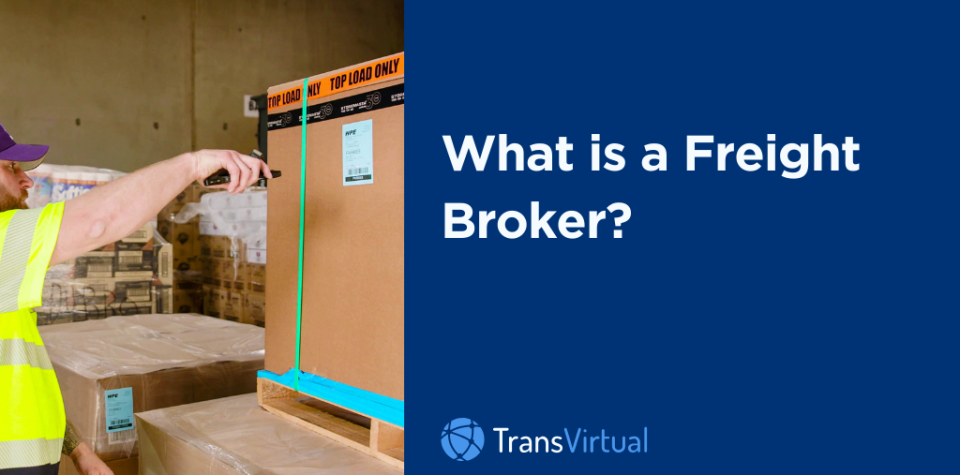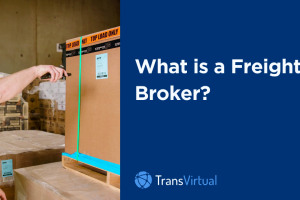A freight broker can be a game-changer for your business.
There are so many moving parts in transport management, and there are just as many ways to waste time, money, and incur damage.
While freight management systems are a great way to keep up with demands, a freight broker can offer additional efficiency. They’re particularly useful for negotiation, account management, and tracking goods.
In this article, we’ll learn all about freight brokers, when you’ll need one, and options to consider when hiring freight brokers for your business.
What is a Freight Broker?
With thousands of different shipping companies to choose from, managing your company’s freight can be a headache. A freight broker’s job is to serve as an intermediary between a shipper and a carrier.
-
They function as a middle man who facilitates communication between the person who has freight to ship and the person who can ship the freight.
-
The freight broker makes sure the handoff between shippers and carriers goes as smoothly as possible. They track and trace shipment to ensure everything arrives on time.
-
A good freight broker is skilled in route planning and rate negotiation. They’re capable of turning a very complicated and messy process into something much more manageable.
-
A freight broker can also help a carrier optimise their routes and increase their earnings.
Overall, freight brokers play a major role in improving delivery and supply chain efficiency for both carriers and shippers.
What is the difference between freight brokers, freight agent, and freight forwarders?
While freight brokers don’t directly handle freight, freight forwarders assume control of the shipment. They’re responsible for storing, packing, and transporting it under their own operating authority.
A freight agent, on the other hand, handles tasks such as working with carriers, organising freight transportations. A freight broker can do all these, in addition to creating invoices, conducting audit checks, maintaining compliance standards, and processing claims.
Benefits of freight brokerage partnerships
As you can see, there are benefits to using freight brokerage if your company ships or carries freight. At the end of the day, using a freight broker will save you time, money, and create a beneficial partnership.
1. Savings
Partnering with a reliable freight broker is a smart way to save you both time and money. If you’re looking for a way to make managing your business easier, this one is life changing.
The biggest savings benefits stem from the broker’s experience and carrier options while saving you the hassle of navigating the often chaotic shipping industry.
Keep in mind that one of the most important things a freight broker does is monitor the transportation market. That means they have expert awareness of price volatility and can get you the best possible price for a shipment.
They also puts a significant amount of effort into maintaining relationships with the carriers in their network. This familiarity also helps ensure they get you the best possible price for shipping.
2. Convenience
One of the best parts about working with a freight broker is the convenience you get from partnering with a reliable resource in the freight management industry.
You don’t have the time to sit down and evaluate different carrier options for your shipment, but a freight broker does. They can advocate on your behalf and make sure you end up working with carriers you trust.
3. Expertise
When you employ the help of a large freight brokerage, you benefit from their in-depth knowledge and broad network of potential carriers.
A freight broker vets the carriers in their network for reliability, track record, and areas of expertise. They also make sure their carriers have the correct insurance, can cater to various shipping methods, and meet all permit requirements.
Freight brokers can connect with international carriers as well. It’s a great solution for businesses looking to scale in global markets.
4. Timely and secure deliveries
In addition to vetting carriers and planning shipping routes, your broker may offer the ability to track your shipment online. Knowing your shipment is secure and in the hands of experts gives you peace in mind and allows you to dedicate your attention elsewhere in your operations.
5. Partnership
Good business is contingent on solid relationships. Shipping companies and freight brokerages take their relationships with each other very seriously. For shippers, brokers, and carriers, the goal is always mutually beneficial.
That means relationships between this triad are about more than maintaining a bottom line. A good broker will prioritise the goals of their clients and fulfil the duties of their role.
Committing to a long-term partnership with a freight brokerage is in your best interest. This enables the broker to get to know your company in-depth and provide you with consistent and reliable service.
6. Prevent oversight
A freight brokerage navigates shipments every day. They know all of the ins and outs of the industry and can do what it takes to provide a seamless experience for their customers.
That means you can trust your freight broker to reliably fill out the proper forms, schedule loads on time, and solve problems when something goes wrong. Their oversight ensures you avoid any unnecessary challenges with your shipment.
Factors to Consider When Hiring a Freight Broker
At the end of the day, you want to find a partner that has your best interests at heart. But in a sea of thousands, how do you find freight brokers that can give you a competitive advantage? Here are a few factors to consider:
-
Only work with licensed brokers: Always check if the broker has a valid license before accepting load from them. Not only does this save you from any legal complications that may happen, licensed brokers are knowledgeable about the industry and are up to date with the latest regulations.
-
Check their reputation: Experienced and reputable brokers are more likely to already have established relationships with known carriers. And the bottom line is, who wouldn’t want to work with someone who has a great reputation in the industry?
-
Insurance coverage: It’s crucial to verify that a broker is insured. This step protects your business if the broker fails to pay for a load. Ensuring the broker has valid insurance means you can file a claim to get your payment, giving you peace of mind.
-
Run a finance and credit check: Do your due diligence and run a credit check if they have a good financial standing.
-
Technology: Technology can optimize logistics, enhance shipment visibility, and provide data analysis and business intelligence. Brokers with up-to-date transport and delivery management technology offer real-time updates on load status and valuable network insights, including shipper performance comparisons.
Of course, it’s always a good idea to do some research of your own. Stay up to date of ongoing rates by utilising carrier comparison platforms. Occasionally using an experienced dispatcher can also help you see if they can negotiate better rates and assess whether your broker is offering the best freight rates.
Find a freight broker you can trust
When you hire a freight broker, you get the peace of mind of knowing that an essential part of your business is getting the expert handling it requires. You’ll also gain the benefit of a close and lucrative business relationship.




